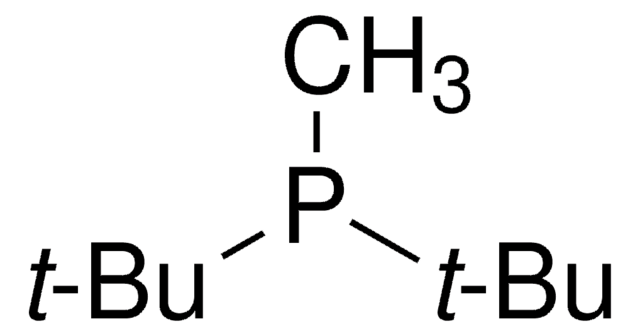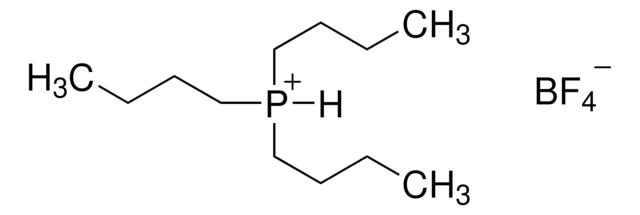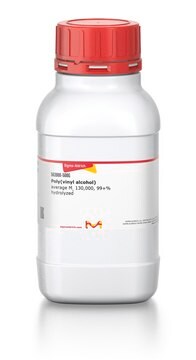643777
Di-tert-butyl(methyl)phosphonium tetrafluoroborate
97%
Synonym(s):
(t-Bu)2PMeHBF4, Bis(1,1-dimethylethyl)methylphosphine tetrafluoroborate
About This Item
Recommended Products
Assay
97%
form
solid
reaction suitability
reaction type: Buchwald-Hartwig Cross Coupling Reaction
reaction type: Heck Reaction
reaction type: Hiyama Coupling
reaction type: Negishi Coupling
reaction type: Sonogashira Coupling
reaction type: Stille Coupling
reaction type: Suzuki-Miyaura Coupling
reagent type: ligand
reaction type: Cross Couplings
pH
1.79 (1% in solution)
mp
>230 °C (lit.)
functional group
phosphine
SMILES string
F[B-](F)(F)F.C[PH+](C(C)(C)C)C(C)(C)C
InChI
1S/C9H21P.BF4/c1-8(2,3)10(7)9(4,5)6;2-1(3,4)5/h1-7H3;/q;-1/p+1
InChI key
BRDLRXCAHKUWJS-UHFFFAOYSA-O
Looking for similar products? Visit Product Comparison Guide
Application
Signal Word
Danger
Hazard Statements
Precautionary Statements
Hazard Classifications
Eye Dam. 1 - Skin Corr. 1B
Storage Class Code
8A - Combustible corrosive hazardous materials
WGK
WGK 3
Flash Point(F)
Not applicable
Flash Point(C)
Not applicable
Personal Protective Equipment
Certificates of Analysis (COA)
Search for Certificates of Analysis (COA) by entering the products Lot/Batch Number. Lot and Batch Numbers can be found on a product’s label following the words ‘Lot’ or ‘Batch’.
Already Own This Product?
Find documentation for the products that you have recently purchased in the Document Library.
Our team of scientists has experience in all areas of research including Life Science, Material Science, Chemical Synthesis, Chromatography, Analytical and many others.
Contact Technical Service









